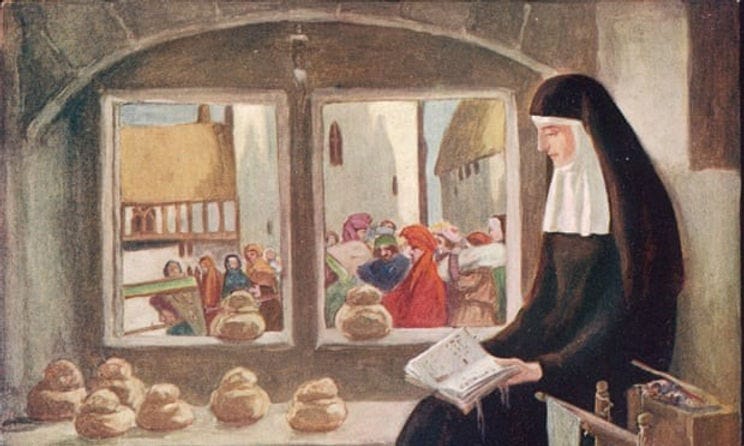If you read my post from last week, you’ll know that I thought it would be my last before giving birth. Baby has other ideas. Not only has she not arrived, but it seems entirely within the realm of possibilities that she may not come for another week or even ten days.
As I await her arrival eagerly, I thought I’d share with you a quick reflection on 14th-century English mystic Julian of Norwich. Julian wrote a marvelous book called Revelations of Divine Love, in which she recounts sixteen mystical visions she had at the age of thirty following an almost fatal illness. The book is interesting for all sorts of reasons, but the aspect I personally keep going back to is her discussion of Jesus as our mother. Julian was not unusual in this characterisation at the time, but today we are perhaps less accustomed to it, thinking more often of Our Lady as our mother instead.
But in what sense is Jesus a mother figure to us? Well, Julian starts by pointing out that all mothers bear us into the world through the pain of childbirth - you can see why I have this on my mind at the moment! Similarly, Jesus suffered pain of extreme intensity in his passion on the cross, to allow us to be reborn spiritually. Julian emphasises how Jesus willingly and lovingly undertook ‘the sharpest blows and most grievous pains that ever were or ever shall be’ before his death, and all of this out of love for us. He is not a mother figure just in the general sense of being wise or caring or gentle, but rather in the more concrete and physical sense of suffering so that a new kind of humanity can be born.
Having had a somewhat traumatic experience of labour and delivery with my first child just over a year and a half ago, Julian’s Christ-centred vision of childbirth is incredibly healing, encouraging, and hopeful. One day, perhaps, I will write in full about what happened during the birth of my son, but for now the point I want to make is that childbirth can be terrifying in how it completely removes control from you, and it can feel very lonely (even if you have a supportive husband standing right by you!). But Julian reminds us that no woman in the pangs of childbirth is alone. Jesus has experienced her same suffering, and even more. He knows what it’s like to be a mother. He knows what it’s like to worry, and what it’s like to face something you’re terrified of, like physical pain, for the sake of your child. So this post, really, is a reminder to myself in the final days of this pregnancy, that Christ is my model of motherhood, in his courage and endless love, and through him, I can do things I did not think myself capable of. Here’s to hoping that baby comes soon!
N. B.: If you’re interested in reading more about Julian of Norwich and motherhood, why not take a look at a recent Fairer Disputations article I wrote called ‘Toward a Theology of Birth?’. It contains an expanded discussion of Christ’s spiritual motherhood, Mary’s own Christ-centred model of motherhood, as well as the role of suffering in childbirth.




Very brave.
You are very brave!